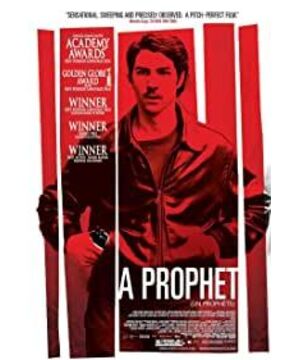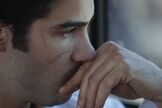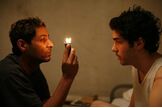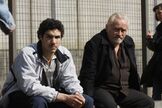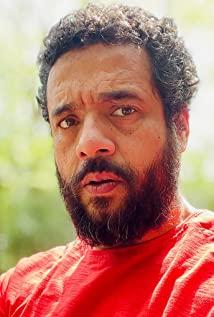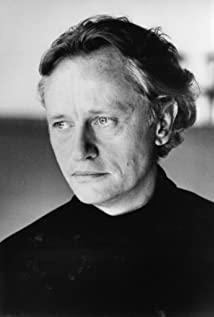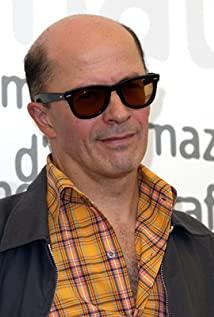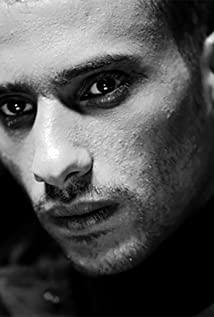Among those French films with a flamboyant language, The Prophet is not a complicated film, because its story is simple and its use of genre, as Jacques Audiard puts it, is instantly recognisable by the audience, "It is There are definite rules, and definite codes that the audience knows." Jacques Audiard was the one who let those rules and codes "create something big"; he turned the rotten into the magic. 'The Prophet' took the wonderful stride he had hoped, towards a beautiful venue: a film in a vulgar format, but with a captivating narrative, so that "elements of art cinema could be interspersed to reach the largest audience. "
"The Prophet" is a film where ten minutes pass and people find that they cannot remain indifferent; twenty minutes later, they know they are encountering what may be the best French film of the decade. You can feel every frame of that frame of information is unmissable, that punchy shot is beautiful. And the man behind the camera, reveling in his observation, directs everything there, making the whole set come alive.
However, Jacques Audiard is not a director who is hands-on and interested in everything; if it is just an empty shot, he will be disappointed and become disoriented until a character from the script walks in. , only to greet him with enthusiasm. He said that a large part of what he likes to do is to communicate with the actors, to invoke their performance power as much as possible and release them; let them get together and watch them behave "like a truck full of goods" train".
The Prophet, then, is a movie about characters. Vivid characterization builds up every aspect of it, including its test-worthy classicity.
The film begins with the imprisoned Arab Malik, played by Taha Rahim. Here is actually a harsh gang society. Malik must choose his umbrella and adapt to the new rules of survival in order to keep himself alive. He takes orders from Caesar, the boss of the Corsican mafia, who first removes an opponent for Caesar in prison, and then helps him perform some tricky tasks outside the prison. Malik dared to work hard and was clever, and soon built his own drug network with the help of Caesar's relationship.
Between Malik and Caesar there is the most authentic viewing experience of the entire film, as the Los Angeles Times points out, the two characters "provide the film with very clear drama." The narrative talent of Jacques Audiard is also in them, gradually flowing over time and converging into a torrent of art. It's unbelievable. But Jacques Audiard did it. He discarded other possible clues and just kept the camera close to his character, or the camera was like Malik's eyes, going with Malik to every corner, taking in what he saw and heard . It will be like a person growing up, initially he has limited vision, and when two-thirds of the time of the movie has passed, he is no longer the nineteen-year-old, he is the new boss, his control has been The drug network spread with him spread all over France.
"I stared at him," not convinced that this was the desired actor, but, "I looked into his eyes, there was no melancholy, no tragedy, just a person, very bright and full of energy." Jacques Odia said why Taha Rahim and not 40 or 50 other actors he auditioned to play Malik. Taha Rahim finds he still has a lot of work to do before he starts working on The Prophet, he has to start from scratch and play a brand new criminal character, the gangsters in the prison movies of the past can't satisfy Jacques Audiard . "The characters in 'The Prophet' convey a new criminal archetype: Taha Rahim's criminal is not a psychopath, he is a clever, almost angelic man," says Jacques Audiard. " I wanted to create a character like that. He could learn the proper way to survive in prison. The character would be a blank piece of paper at the same time, and he would acquire a new identity in the gang."
As for Nils Alestrup, who won the Caesar Award for Best Supporting Actor again because of "The Prophet", his role as the Corsican mafia boss Caesar, in the opinion of Jacques Audiard, is "one The lion playing with food" as he tries to control the new prisoners. Nils Alestrup not only interprets real characters, but also performs a real state that brings a pleasant coloration to the eyes of the audience who have been immersed in the film for so long.
There are also those indispensable supporting roles, who split into two magnetic poles, repel each other, and attract each other, which together lead the drama to tension and excitement. What about the role of Jacques Audiard? Although he is hidden, he is ubiquitous; with every sincere admiration from the audience, the image of the Parisian becomes more vivid in the film. "If I let the actors bare themselves and try to keep the characters naked, I have to expose myself at the same time," says Jacques Audiard. "That's the key to creating excitement."
But The Prophet is still regarded as critical because of its clear orientation to reality: a criticism of society, a criticism of human nature.
Jacques Audiard said "The Prophet" is a film similar to "History of Violence". However, a social critical perspective is not for him to accept after all. Because it's just a movie. "It's fictional. It doesn't originate anywhere," he said. He would rather see the prison in the film "as a metaphor for society", because the prison here has a set of cruel rules in society. But only there. "I don't want to take a cultural or sociological model of analysis. I'm only interested in the situation of the mafia." He stressed that the starting point of the story is "the mafia in prison".
Quentin Tarantino couldn't contain his liking for "The Prophet," and throughout the viewing, he shouted at times, and Taha Rahim, who played Malik, noticed him, "Like a child, Waving your arms and immersing yourself in the film.” He couldn’t be indifferent to the violence, because it was as pure as the film itself.
There are only a handful of violent scenes in The Prophet, and only one can turn people around. That's when Malik kills for the first time in the film, it doesn't come suddenly, it gets enough brewing by Jacques Audiard, and it's pretty immediate and punchy. It's like a sign that can't be ignored. In addition to stating that this is the finishing touch of a good dress, it accounts for the initial driving force of a character's growth: what kind of environment a person is in and can be inspired by so wild?
The violence of the film is scattered in every frame, and it looks like it is put into a brown glass bottle, which is invisible, but it will shatter the bottle and explode on the screen at any time. Therefore, it is difficult to determine whether the scene of Malik killing Caesar's boss is full of psychological shock; because it is much less violent than Malik's first murder: the violence and blood are all in one It was carried out in a watermelon, and the last picture reminded the audience that it shattered. Judging from the handling of the whole scene, it carves out a sense of extreme tension, which goes straight to Malik's fear. In contrast to the fantasy shots that haunt Malik and terrify him, this scene, which does not escape reality at all, has an air of fantasy that actually and effectively functions; it is actually a description of the psyche. "Dream-like, fantasy places, maybe give Malik an inner life to explore," says Jacques Audiard. This is also the kind of film that Jacques Audiard wants, a film that crosses genres.
Jacques Audiard is such a director. He was so engrossed in the filming that he made himself so personal that he couldn't recognize his face, his voice. He sees himself as a lunatic, a sorcerer. Filming "exhausted me," he said. So the time gap between "Lip Talk" and "The Rhythm My Heart Forgot", "The Forgotten Rhythm of My Heart" and "The Prophet" is the same four years. Among the three works, "The Prophet" is undoubtedly an impressive masterpiece of Jacques Audiard, with its conscious use of film language and its relish in characterization, helping French films in the wilderness of film It opens up new horizons and captures new silhouettes of beauty.
Original "Cinema World"
View more about A Prophet reviews


